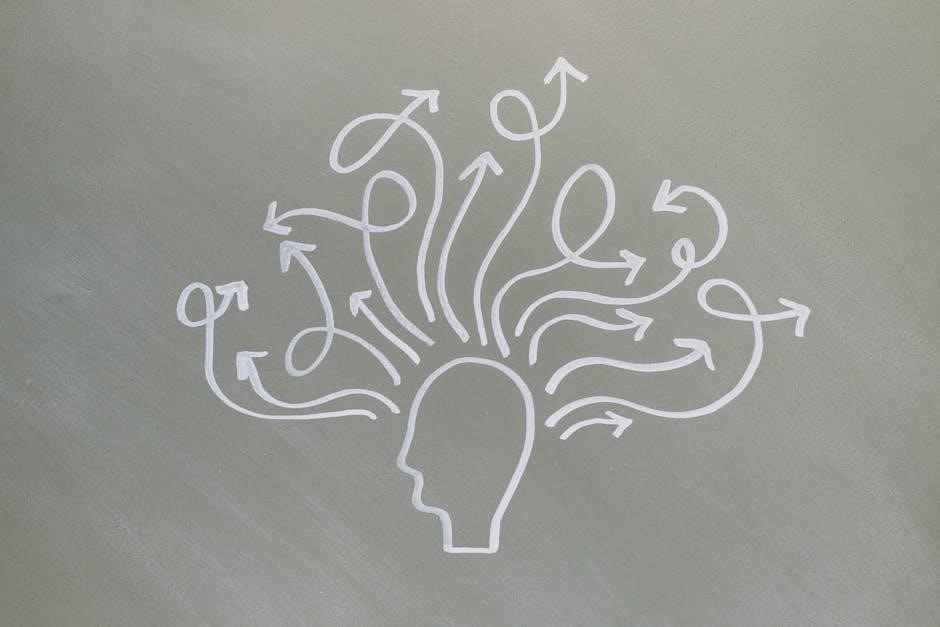Developmental psychology studies human growth and changes across the lifespan, focusing on physical, cognitive, and social development․ It explores how individuals adapt and evolve from birth to old age․

Theoretical Foundations
Developmental psychology is rooted in theories that explain human growth processes, including biological, cognitive, and social influences, offering frameworks to understand individual development across the lifespan․
2․1 Psychosexual Development: Freud’s Theory
Sigmund Freud’s psychosexual development theory proposes that personality evolves through a series of stages, each linked to a specific erogenous zone․ The oral, anal, phallic, latency, and genital stages represent distinct phases where individuals seek pleasure․ Freud argued that unresolved conflicts during these stages could lead to fixations, shaping adult behavior and personality․ For example, the phallic stage introduces the Oedipus complex, influencing gender identity and moral development․ Freud’s theory emphasizes the role of unconscious desires and early childhood experiences in determining lifelong psychological outcomes․ While controversial, his ideas remain foundational in understanding human development, particularly in how early conflicts impact adult behavior and psychological health․ This theory is a cornerstone of psychoanalytic thought, offering insights into the interplay of biology and environment in shaping human behavior across the lifespan․
2․2 Psychosocial Development: Erikson’s Stages
Erik Erikson’s theory of psychosocial development outlines eight stages, each representing a unique conflict that individuals face at different life stages․ These stages—trust vs․ mistrust, autonomy vs․ shame, initiative vs․ guilt, industry vs․ inferiority, identity vs․ role confusion, intimacy vs․ isolation, generativity vs․ stagnation, and integrity vs․ despair—shape personality and social skills․ Each stage builds on the previous one, with successful resolution fostering healthy development․ For example, the first stage, trust vs․ mistrust, occurs in infancy, where caregiver reliability shapes a child’s sense of security․ Erikson’s theory emphasizes the role of social interactions and cultural influences in development, offering a lifespan perspective that extends beyond childhood into adulthood and old age․ His work highlights the importance of adapting to societal expectations while maintaining a sense of self, providing a comprehensive framework for understanding human development across the lifespan;
2․3 Cognitive Development Theories
Cognitive development theories explore how individuals process information and understand the world․ Jean Piaget’s theory proposes four stages: sensorimotor, preoperational, concrete operational, and formal operational․ Each stage reflects advancing cognitive abilities․ Lev Vygotsky’s sociocultural theory emphasizes social interactions and language in shaping cognition․ Modern research integrates neuroscience and cultural perspectives, highlighting the role of environment and biology in cognitive growth․ These theories explain how thinking evolves from infancy to adulthood, influencing learning, problem-solving, and memory․ Understanding cognitive development aids in designing educational strategies and assessing intellectual milestones․ The interplay between nature and nurture remains central, as researchers explore how genetic predispositions and environmental factors shape cognitive processes across the lifespan․ These theories provide a foundation for studying mental development and its implications for education and psychology․
2․4 Social Learning Theory: Bandura’s Contributions
Social Learning Theory, developed by Albert Bandura, posits that behavior is acquired through observation, imitation, and modeling․ Bandura’s famous Bobo doll experiments demonstrated how individuals, especially children, learn by watching others and imitating their actions․ He introduced the concept of reciprocal determinism, where behavior, personal factors, and environmental influences interact․ Bandura also emphasized the role of reinforcement in sustaining learned behaviors․ His work challenges traditional behaviorist views by incorporating cognitive processes, such as self-efficacy and observational learning․ Bandura’s theory provides a comprehensive framework for understanding how social interactions shape behavior across the lifespan․ It has been widely applied in education, psychology, and behavioral interventions, offering insights into how individuals develop and modify their behaviors in various contexts․ Bandura’s contributions remain foundational in explaining the interplay between observation, cognition, and environment in shaping human behavior․

Domains of Development
Developmental psychology examines growth across four key domains: cognitive, social, emotional, and physical․ Each domain explores unique aspects of human development, shaping individual capabilities and interactions throughout life․
3․1 Cognitive Development
Cognitive development focuses on the growth of mental processes, including memory, problem-solving, and language․ It explores how individuals acquire, process, and use information across their lifespan․
Theories suggest that cognitive abilities evolve through stages, such as Piaget’s sensorimotor and formal operational stages․ These stages reflect qualitative changes in thinking and understanding the world․
Research highlights the role of external factors, like education and environment, in shaping cognitive growth․ For instance, children’s media and teacher interactions influence their views on science and learning․
Understanding cognitive development aids in designing educational strategies and interventions to support intellectual growth and adaptability throughout life․
3․2 Social Development
Social development examines how individuals form relationships, understand social norms, and develop a sense of identity․ It is shaped by interactions with family, peers, and culture․
Erikson’s psychosocial theory highlights stages like trust vs․ mistrust and identity vs․ role confusion, emphasizing the role of social interactions in building self-concept and emotional well-being․
Factors such as family dynamics, cultural values, and societal expectations influence social skills and behavior․ Positive social development fosters empathy, cooperation, and the ability to navigate complex social environments․
Research also explores how external factors, like media and education, impact social perceptions and behaviors, particularly in children and adolescents․
3․3 Emotional Development
Emotional development involves the progression of understanding, expressing, and managing emotions throughout life․ Infants begin with basic emotional responses, while children develop more complex feelings․
Key milestones include recognizing emotions in others, developing empathy, and learning emotional regulation․ Adolescents often experience heightened emotional intensity due to hormonal changes․
Factors like family environment, cultural norms, and social interactions significantly influence emotional growth․ Positive early experiences, such as secure attachments, foster healthy emotional development․
Challenges, like trauma or neglect, can impact emotional well-being, potentially leading to long-term emotional difficulties․ Understanding emotional development aids in promoting mental health across the lifespan․
3․4 Physical Development
Physical development refers to the growth and maturation of the body and brain across the lifespan․ It encompasses changes in height, weight, and physical abilities, as well as brain development․
Early childhood sees rapid growth, with milestones like walking and fine motor skills․ Adolescence brings puberty, marked by significant physical changes due to hormonal shifts․
Genetics and environmental factors, such as nutrition and health, play crucial roles․ Physical development lays the foundation for overall well-being and functionality at every life stage․

Research Methods in Developmental Psychology
Research methods in developmental psychology are diverse and tailored to study human development across the lifespan․ Common approaches include longitudinal studies, which track individuals over time, and cross-sectional studies, which compare different age groups at a single point․
Experimental designs are used to test hypotheses about developmental processes, while observational methods, such as naturalistic and laboratory observations, provide insights into behavior and interactions․
Neuropsychological assessments and psychophysiological measures, like fMRI and EEG, are employed to study brain development․ Surveys, interviews, and standardized tests are also widely used to gather data on cognitive, social, and emotional growth․
Challenges include ensuring ethical practices, particularly with children, and addressing issues like participant attrition in long-term studies․ These methods collectively help researchers understand the complex processes underlying human development․

Applications in Real-World Settings
Developmental psychology has practical applications across various real-world settings, enhancing our understanding of human growth and behavior․ In education, it informs teaching practices and curriculum design, ensuring age-appropriate learning strategies․
In healthcare, insights from developmental psychology guide interventions for at-risk populations, such as children with low birth weight, improving their physical and cognitive outcomes․
Policy-making benefits from developmental psychology, as research shapes programs addressing early childhood development and lifelong learning opportunities․
Additionally, mental health services utilize developmental principles to provide age-specific therapies, fostering emotional well-being across the lifespan․
Media and technology sectors also apply these concepts to create content that aligns with children’s developmental stages, promoting healthy growth and understanding of societal norms․
Developmental psychology offers profound insights into human growth and change across the lifespan, emphasizing the interplay of biological, cognitive, and social factors․ By understanding these dynamics, researchers and practitioners can address real-world challenges, such as improving educational outcomes and supporting mental health․ The field’s emphasis on lifespan development highlights the continuous nature of growth, from infancy to old age․ Emerging research, such as studies on very low birth weight children, underscores the importance of early interventions․ Additionally, theories like the mental protective system provide frameworks for understanding psychosocial stages․ As developmental psychology evolves, its applications in education, policy, and healthcare continue to grow, offering evidence-based solutions to enhance human potential․ This field remains vital in fostering a deeper understanding of human development and its lifelong implications․
